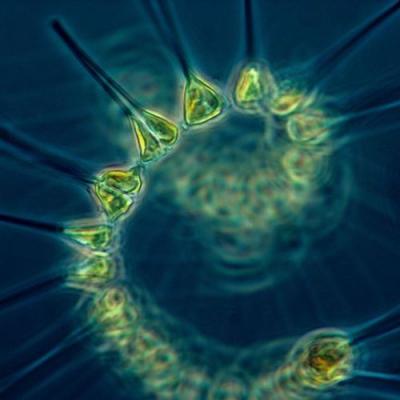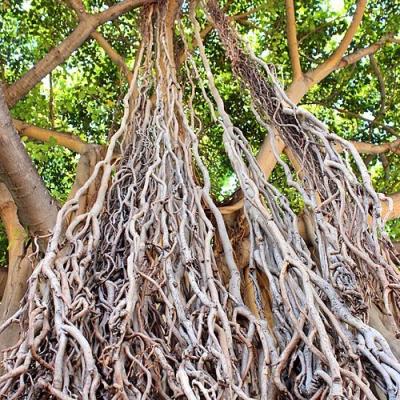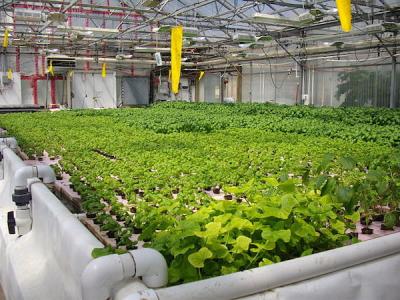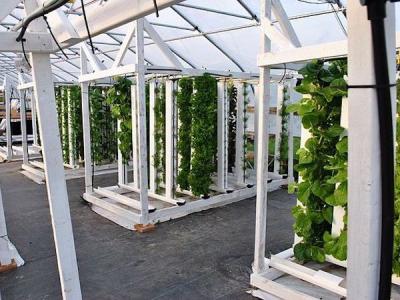Materials for Plant Growth
Clarification Statement: Emphasis is on the idea that plant matter comes mostly from air and water, not from soil.
What do Plants Need to Grow?
Plants are organisms that photosynthesize—they use sunlight as their source of energy for growth and survival. There is a huge diversity of plants, from tiny microscopic algae, called phytoplankton (Fig. 1), to giant banyan trees (Fig. 2). Plants also grow in a wide variety of environments, from deserts to rainforests, in fresh and salt water, high on mountain tops, and low in valleys. Without the diversity of plants, life on Earth would not exist as we know it.
FIg. 1. Phytoplankton are microscopic plants that live in bodies of water and are the base of many food webs.
Image courtesy of NOAA, Wikimedia Commons
Fig. 2. Banyan trees, like this one found in Honolulu, can reach enormous sizes.
Image courtesy of Aaron Zhu, via Wikimedia Commons
Fig. 3. Photosynthesis stores energy, fixes carbon into energy-rich carbon-hydrogen bonds, forms plant matter, releases oxygen, and maintains plants’ activities.
Image courtesy of Wikimedia Commons
How is it possible that plants can survive in such different conditions? It's simple really—plants get the materials they need to grow cheifly from air and water! Sunlight provides the energy plants need to convert water and carbon dioxide (CO2), a major component in air, to carbohydrates, such as sugars, in a process called photosynthesis (Fig. 3). Plants can then use these sugars to build and grow new material. So, where there is air, water, and sunlight, plants can grow!
Note: Soil is still critically important to the growth of plants in nature and to the growth of food crops. Check out this article by the National Science Foundation to learn more about how "Soils are complex ecosystems composed of organic matter, minerals, water, air – and billions upon billions of organisms. These ecosystems orchestrate the processes essential for plant growth, as well as food and fiber production."
Plants in the Ocean
In the marine environment, there are three general types of plants: sea grasses, macroalgae (seaweed), and microscopic phytoplankton (Fig. 4). None of these marine plants require soil to grow! In fact, phytoplankton drift through the water and obtain their nutrients directly through their cell walls. Macroalgae are anchored to the sea floor, but they don’t have roots; they obtain all their nutrients from the water directly through their tissues. Sea grasses, on the other hand, have roots just like plants on land, and they take up nutrients from their roots. But, sea grasses are generally found in very sandy environments, which may have low amounts of important nutrients, so sea grasses also take up nutrients directly through their leaves.
Fig. 4. From left to right: the three main types of plants in the ocean include sea grass (a true vascular plant), macroalgae (known as seaweed or limu), and microscopic phytoplankton (often single-celled).
Images courtesy of the NOAA Photo Library
Although marine plants have adapted to living in the water, land plants use soil for structure, water retention, and nutrient access. But, is soil necessary for land plant growth? No! Farmers and home gardners are using hydroponic systems to provide plants the benefits of soil to grow food in tight spaces and with less pests!
Hydroponic Systems
Hydroponics is a method of growing plants without soil. In hydroponic systems, oxygenated and nutrient enriched waters are delivered directly to plant roots. Although most plants grow in soil, the soil itself is not necessary to plant growth. Plants actually need the nutrients and water within the soil. In addition, plants need sunlight and carbon dioxide (CO2). Plants get carbon dioxide mainly from the air (or from the water if they are aquatic plants). This means that the carbon used to make up the biomass, or volume and weight of plants and trees, comes chiefly from the air!
The term hydroponics comes from the latin root words hydro and ponos, meaning water and labor. In hydroponic systems, water does the work of delivering nutrients to plants—instead of soil! There are many different types of hydroponic systems, with a range of complexity and expense. As long as water can be circulated throughout the roots, plants will be able to grow.
Examples of some systems are:
- Series of pipes, with roots submerged in highly oxygenated and nutrient enriched water (Fig. 4).
- Vertically hanging with roots exposed to water spray/flow (Fig. 5).
- Use of root supports other than soil that allow for consistent water flow. For example cinder, coconut husks, vermiculite, or gravel.
Fig. 5. Hydroponic systems make it possible for larde scale production of food with less wasted space and water.
Image courtesy of Wikimedia Commons
Fig. 6. Vertical hydroponic systems allow for more growth opportunity in smaller spaces.
Image courtesy of Wikimedia
Nutrient Levels
To grow plants hydroponically, it is helpful to maintain proper nutrient levels. For small scale systems, pre-mixed plant food is an easy way to add additional nutrients (available at a local plant nursery or hardware store). Generally, a nutrient mix contains a balance of the three main elements important for plant growth: nitrogen (N), phosphorus (P), and potassium (K). Other nutrients may include calcium (Ca), magnesium (Mg), sulphur (S), iron (Fe), manganese (Mn), copper (Cu), zinc (Zn), molydenum (Mo), boron (B), and chlorine (Cl).
pH Levels
In addition to nutrients, it is important to ensure the pH is balanced. The pH is a measure of how acidic or alkaline a solution is. Note that the pH scale scale is logarithmic, so the differences at the high and low ends of the scale are more extreme than in the middle (Fig. 6).
Fig. 7. The pH scale compares the acidty or alkalinity of various solutions.
Image courtesy of Wikimedia
As plants extract nutrients from the water, the water will become less acidic and the pH will increase. This change in acidity affects the plants' ability to take up the essential nutrients. In fact, if the pH gets too high or too low, plants will stop being able to take in nutrients, leading to a nutrient deficiency within the plants. Generally, the optimum range of pH for plants grown hydroponically is between 5.5 and 6.5, but this may vary across plant species. For more information on the ideal pH of a hydroponic solution, refer to resources such as Perfecting the pH of your Hydroponic Nutrient Solution.
Hydroponics Vocabulary
|
















